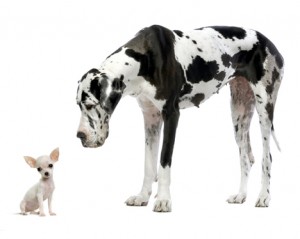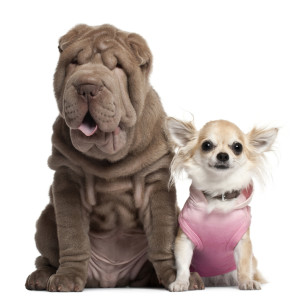With an average weight of just 3-5 pounds, there’s no denying the fact that Chihuahuas are small dogs. In fact, they are oftentimes considered THE smallest breed in the world. Of course this is just one of the many reasons why people choose to own pet Chihuahuas over other types of dogs. However, their small size oftentimes raises the issue of whether or not it’s safe to raise them around larger dogs. Families who already have larger dogs at home may need to use caution when adding a small Chihuahua into the mix, as there’s always the possibility for injury or even death.

Common Problems With Chihuahuas and Larger Dogs
The main issue that arises when raising Chihuahuas around larger dogs is the threat of injury. If a small Chihuahua snaps out in aggression towards a larger dog, it could provoke an attack in retaliation. Depending on the size and demeanor of the larger dog, this attack may result in serious life-threatening injury. Even though they are one of the smallest dog breeds in the world, Chihuahuas like to act big and bad, which puts them in harm’s way if you aren’t there to mediate the situation.
Another instance where fights are quite possible is during feeding. It’s all too common for two dogs to growl or even snap out at each other when food is around. Unfortunately, this type of behavior must be stopped if you want to create a safe and healthy environment for your Chihuahua to live in. Even if your dogs aren’t physically fighting with one another, showing teeth and making growling noises are signs of aggression that can lead to more serious confrontations in the future.
Socializing BOTH Your Chihuahua and The Other Dog
One of the key steps to create a safe environment for your dogs is to socialize them at an early age. Ideally, you should take them out to the local park or outdoor community areas where they will be exposed to other people and dogs. In today’s world where owners are busy with work, school and day-to-day chores, doing this is easier said than done. However, you must not underestimate the importance of early socialization for your Chihuahua and any other dogs in your family. Forcing them to stay cooped up in the house all day every day won’t allow them to develop the social skills needed to interact with others; therefore, they will naturally want to fight with other dogs for no reason at all.
Here are just a few of the many places where you can take your dogs to improve their socialization skills:
- Gated dog parks where owners bring their dogs to play with others.
- Obedience training classes.
- National chain pet stores, such as PetsMart or Petco.
- Over to a friend of family members house who also has a dog.
- Walks around the neighborhood.
- Exploring down by a river where people frequently visit.
- For car rides around town (they will likely see other dogs riding in cars as well).

Supervision
If you’re bringing a new Chihuahua into a home environment where there’s already another larger dog, you’ll want to closely supervise the two during the first few months. The truth is that most big dogs will grow to love having a small little companion around the house, but it may take some time. At first, they probably won’t know what to think of this new dog coming into their territory. After all, they’ve been the king of the house up until now, so why’s there a Chihuahua coming in and trying to take over?
As long as neither they aren’t showing any signs of aggression, you should be able to let them stay and play together in the same room. Just keep an eye on them and look for signs of anxiety or aggression. If you spot one of them showing their teeth or growling, immediately split them up and say “NO,” followed by taking them elsewhere. There’s no need to spank or physically discipline your dogs for not behaving, but you should tell them “no” in a firm manner. On the other hand, when they are good and play well with one another, give them a treat as a reward.
Feeding Time
You’ll want to pay extra attention to your dogs when it’s feeding time. Whether they are big or small, many dogs feel the need to protect their food by lashing out aggressively at other dogs, people or pets that come their way. Hopefully your dogs won’t have this problem, but if they do, you’ll need to know what the correct response is.
More often than not, dogs that last out with aggression during feeding time usually aren’t getting fed enough throughout the day. As a result, they instinctively feel threatened by others that come around their food. So how much should you be feeding your dogs each day? It really depends on a variety of factors, such as their breed, health, age and activity levels. A good rule of thumb, however, is to feed them two medium-sized bowls of food each day. If you feel this amount isn’t enough, talk to their veterinarian to determine a more precise and accurate feeding plan.
Another idea to help eliminate dinner time aggression is to place your dogs’ food bowls in different areas of the house. Perhaps your Chihuahua can eat in the living room or bathroom, while your larger dog eats their food in the kitchen. Since they are far away from one another, there shouldn’t be any reason for them to act aggressively.
References:
Our bigger dog and chihuahua always got along and played so well together. One day, our bigger dog got very excited and pounced on our chihuahua breaking his leg. Which long story short, resulted in his leg being amputated.
I have always loved great danes and hoped to one day have a harlequin dane I even picked out her name and made plans to get her when I finally buy my 1st house, but about 5 years ago two tiny adorable little chihuahua sisters came into my care, they are my forever family now, and I adore them. I would still love to have a harlequin dane someday, my last one was very even tempered and sweet, but to be honest, no matter what I cant risk my little chi’s all it takes it one bad day and I couldn’t live with that decision, so from now until they are in heaven, no big dogs for me. Thank you all for sharing your stories. Its helped me make up my mind.
I have 2 chihuahuas and a pitbull. The chihuahuas run the show. Never aggression but they call the shots of the dogs. The pitbull is happy to let them get their way. She is so patient. They can even take a bone from her. She looks to me to get it back. Last week we took in an elderly 4lb fox terrier and the pitbull is the same with her. She is loving and patient but she also knows I’ve got her back and she is not allowed to retaliate. When the new dog barked at her she came to me like “mom make her stop ” I call shots over everybody and they know that. I never have any problems. My pitbull loves her chihuahuas. It just depends on the big dogs personality and how you handle your dogs. If I allowed my pit to retaliate she might she might not but I’m not willing to find out.
Some people reading this article might think these risks will never happen to them or that their dogs are good and would never hurt the little ones but I thought the same thing about mine. My chihuahua lived with large dogs for the 4.5 years I owned her without issue until one day one of my large dogs bit my chihuahua for trying to steal food. It was only one bite that probably wouldn’t have hurt our other large dog but our little chihuahua was so tiny, the bite sent her to the emergency where we had to say goodbye to her. It was devastating. It seems it happens more often than people realise as most don’t want to talk about it or admit to others that their dog killed their other dog. It only takes one wrong step and even a small accident can turn life threatening. Please be careful.
hello i have a chuiwawa and a hound dog will my chiwawa bark and misbave with the bigger dog around beacausei read online chiwawas are supposed to not bark thanks.
HMM? I have 5 dogs and not enough room to separate them at feeding time!! The smallest (Chihuahua) growls at the others when ever he is near/with me and they approach!! What do you suggest?
Try feeding them at different times